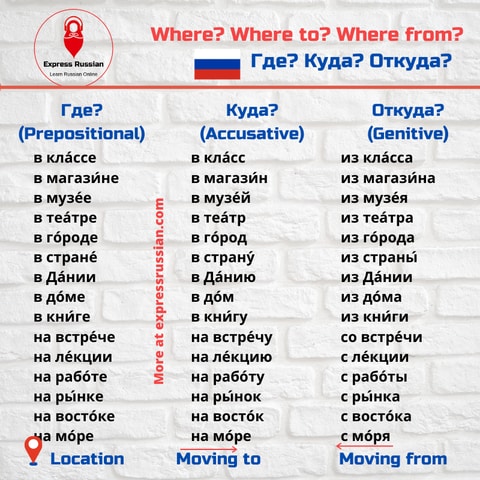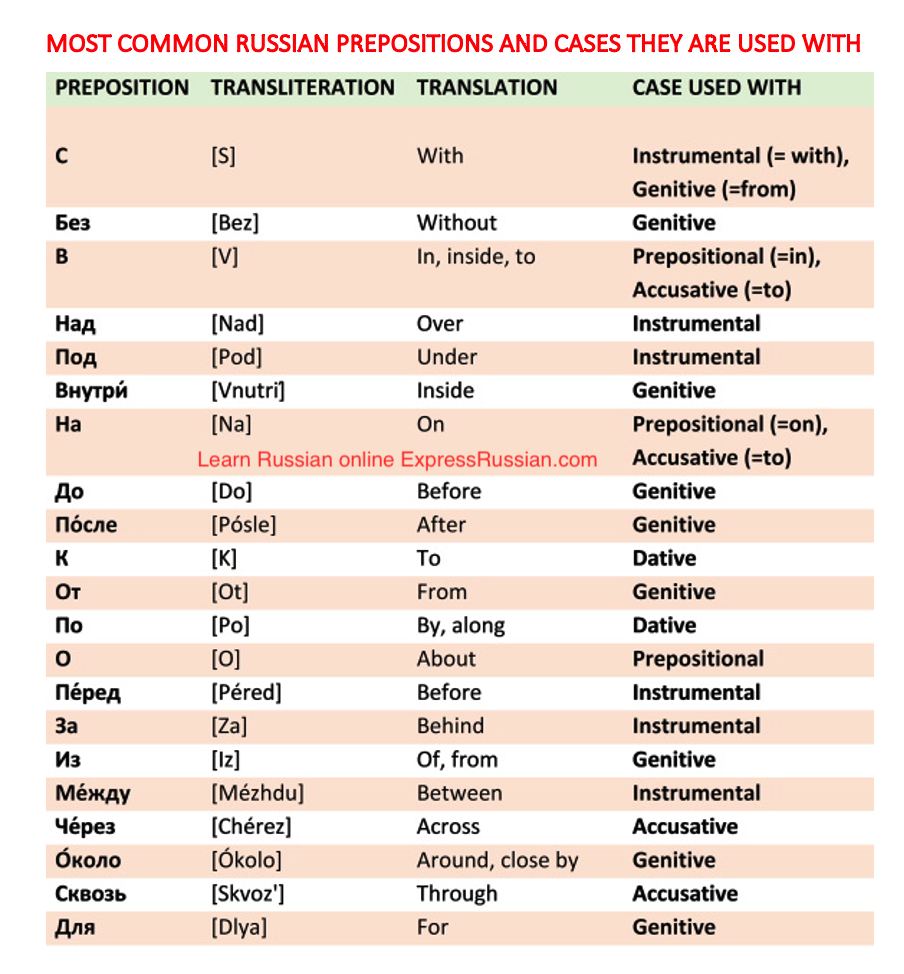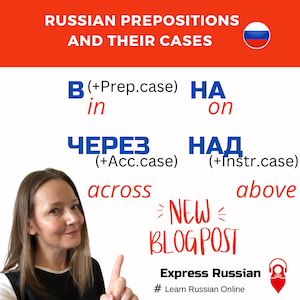Russian prepositions (предлоги) are usually studied in connection with Russian cases. Prepositions stand in front of a noun connecting words in phrases and adding nuances in meaning. Prepositions express location, position, direction, duration or purpose. Their function is very similar to prepositions in the English language.
In this article:
Russian prepositions and their connection to cases in Russian
In this article, we will speak about the most common Russian prepositions in relation to the cases they are used with.
In Russian, nouns conjugate by cases, and prepositions help connect nouns to other words in the phrase.
Some phrases do not use any prepositions, while others – do, just like in English, it depends on the sense or context of the phrase.
Compare:
Я хочу стать_учителем. I want to become a teacher.
Я занимаюсь с учителем. I am studying with a teacher.
In the 1st phrase, there is no preposition, in the 2nd one – we have the Russian preposition C (with). Noun учитель is standing in Instrumental case – учителем (ending in Instrumental case –ем).
Related: Endings in Russian Cases
In this article, we will focus on Russian prepositions in relation to the cases they are used with. Russian cases is a very large topic with many nuances. If you want to understand the logic of Russian cases and master them like a PRO, check out our extensive book on Russian cases.
Russian prepositions used with Prepositional Case
Prepositional Case (Предложный падеж) as the name suggests, can be used only with prepositions. This is the most widely used case in Russian.
If your native language still uses the case system, most probably it would be called “Locative” because the main purpose of this case is to describe a location, in other words – to describe that something is in/inside/on/at, to answer the question где? (where?) or в чём? (in / at what object?).
When we speak about a location, we use prepositions В or НА.
Prepositions В (IN) and НА (ON) in Prepositional
The choice between prepositions В and НА to say IN / AT in the Prepositional Case
The general rule is:
When you need to say IN (INSIDE OF SOMETHING) – use B.
When you need to say ON (ON THE SURFACE OF SOMETHING, AT) – use НА.
Let’s see examples with Russian prepositions В or НА in the Prepositional Case:
Дере́вья расту́т в саду́.
Trees grow in the garden.
Я люблю́ пла́вать в мо́ре.
I like to swim in the sea.
Оде́жда ве́сит в шкафу́.
Clothes hang in the wardrobe.
Я живу́ в Росси́и.
I live in Russia.
Де́ти игра́ют на у́лице.
Children play in the street.
Я люблю́ гуля́ть на приро́де.
I like to walk in nature.
Он рабо́тает в университе́те.
He works at a university.
The difference between prepositions В and НА is explained in depth in this article.
Note: there is a difference between В followed by the Accusative (meaning direction) and В followed by the Prepositional case (meaning placement, location, being in/inside), like in the examples:
он в теáтре – Prep. case (he is in the theater)
VS он идёт в теáтр – Acc. case (he is going to the theater).
We will speak about prepositions В and НА in the Accusative case in the section later, and now there is one more Russian preposition used in Prepositional – preposition O.
Preposition O / ОБ / ОБO (ABOUT)
Preposition O / ОБ / ОБO are used in Prepositional case when we speak about a thought, dream or dispute.
ОБ is used before words starting with a vowel.
ОБO is used before words starting with more than 2 consonants to keep phonetic harmony.
Compare: о ма́ме (about mom) but обо мне (about me).
Я ду́маю о ма́ме.
I think of mom.
Я мечта́ю о ле́те.
I dream of summer.
Сергей расска́зывает о путеше́ствии.
Sergey talks about the journey.
Я зна́ю о нём.
I know about him.
Я чита́ю об Африке.
I’m reading about Africa.
Russian Prepositions used with the Accusative case
Prepositions В and НА in Accusative
As you already know, when Russian prepositions В and НА are used to in the meaning of placement, location, being in/inside – we use Prepositional case.
But there is another meaning to those prepositions and one needs to be careful when using them because the nouns will require a different case and hence – different endings.
In the meaning of direction, prepositions В and НА are followed by Accusative case.
в – to, into (meaning direction, motion towards)
на – to, on to (meaning direction, motion towards)
Compare:
он в óпере – Prep. case (he is in the opera house)
VS
он идёт в óперу – Acc. case (he is going to the opera house).
Similarly, the preposition НА is used with either the Prepositional or the Accusative case, depending on whether you want to convey the idea of location or of motion, e.g.:
он на рабóте – Prep.case (he is at work)
VS
от идёт на рабóту – Acc. Case (he is going to work)
НА is used to translate “to” or “at” before a noun indicating an activity or an event and
В – before nouns indicating buildings or parts of buildings.
Examples: он идёт на рабóту / встрéчу – Acc. case (he is going to work / meeting), but
он на рабóте / встрéче – Prep. case (he is at work / meeting).
Note: always use Accusative when answering the question Куда? / where to? e.g.:
Кудá я иду́? Я иду́ в магази́н (Acc). – Where am I going to? I am going to the supermarket.
Кудá я иду́? Я иду́ в библиотéку (Acc). – Where am I going to? I am going to the library.
Кудá я иду́? Я иду́ на соревновáние (Acc). – Where am I going to? I am going to the competition.
Preposition ПРО (about)
про – about
Я читаю новости про искусственный интеллект.
I read the news about artificial intelligence.
Preposition ЗА (for)
за – for, in support of
Мы голосуем за партию зеленых.
We vote for the Green party.
Preposition ЧЕРЕЗ (through)
чéрез – through, across, in (duration in time)
Переходить через мост. – To cross / go across the bridge.
Встретимся через 10 минут. – Let’s meet in 10 minutes.
Russian prepositions used with the Genitive Case
Preposition У (“in the possession of”, “to have”)
The most usual way to translate “to have” into Russian is not by a verb but with the preposition у + Gen.
For example, “у Мари́ны есть каранда́ш” (Marina has a pencil).
In this phrase, У is the preposition (literally meaning “with, at”), Мари́ны is in Gen. case, каранда́ш is in Nom. case (literally, “with Marina there is a pencil”).
Prepositions из (to) and с (from)
Prepositions из / с denote “direction from”, “moving out of” and require Genitive case
из гости́ницы (from the hotel)
из теа́тра (from the theater)
из зда́ния (from the building)
Note:
из is the opposite of в:
из теáтра – Gen. (from the theater) – в теáтр – Acc. (to the theater)
с is the opposite of на:
с рабóты – Gen. (from work) – на рабóту – Acc. (to work)
Other Russian prepositions with Genitive case
Genitive is also used with such prepositions as:
без (without)> без молокá (without milk)
вдóль (alongside) > вдоль реки́ (along the river)
вмéсто (instead of) > вместо меня́ (instead of me)
вне (out of, outside of) > внe дóма (outside of home)
внутри́ (inside) > внутри́ дóма (inside home)
далекó от (far from) > далекó от гóрода (far from city)
для (for) > для рабóты (for work)
до (before) > до обéда (before lunch)
крóме (besides, apart from) > крóме нас (besides us)
напрóтив (opposite) > напрóтив здáния (opposite the building)
óколо (near to) > óколо реки́ (near the river)
рáди (for the sake of) > рáди успéха (for the sake of success)
пóсле (after) > пóсле шкóлы (after school)
среди́, посреди́ (in the middle of) > посреди́ пóля (in the middle of the field)
сзáди, позади́ (behind) > сзáди меня́ (behind me)
у (in the meaning of “at”, “nearby”) > у библиотéки (by the library)
у (in the meaning of “at the house of”) > у Мари́ны (at Marina’s place)
Now that you know that 3 cases (Prep., Acc., Gen.) can speak about a direction, let’s sum up when you use each case:
- we use prepositions В and НА + Prepositional case to speak about ГДЕ? (WHERE?) smth/someone is located.
- we use prepositions В and НА + Accusative case to speak about КУДА? (WHERE TO?) smth/someone is going towards.
- we use prepositions С and ОТ + Genitive case to speak about ОТКУДА? (FROM WHERE?) smth/someone is coming back.
The illustration below will give you more examples:

Russian Prepositions used with Dative Case
Preposition K (to, towards)
Preposition K (to, towards) is used with Dative when speaking about direction.
На выходны́е я хочу́ пое́хать к ба́бушке.
This weekend I want to go to my grandma’s place.
Де́ти подошли́ к реке́.
Children approached the river.
В воскресе́нье мы пое́дем к друзья́м.
On Sunday, we will go to friends’ place.
Я иду́ в кабине́т к дире́ктору.
I’m going to the director’s office.
Ле́том студе́нты е́здили домо́й к роди́телям.
In the summer, students went home to their parents.
Я подошёл к незнако́мому челове́ку и спроси́л, где нахо́дится метро́.
I came up to an unknown person and asked where the metro was.
Preposition ПО (alongside, round and round)
Preposition ПО is used in Dative Case and is equivalent to “alongside”, “ along”, “round and round”.
Студе́нты иду́т по коридо́ру.
Students are walking along the corridor.
Я ка́ждый день хожу́ по э́той у́лице.
I walk along this street every day.
Мы лю́бим гуля́ть по го́роду.
We love to walk around the city.
Когда́ я ду́маю, я люблю́ ходи́ть по ко́мнате.
When I think, I like to walk around the room.
Preposition ПО is also used in many idiomatic expressions with Dative Case
ле́кция по фи́зике (physics lecture)
заня́тие по матема́тике (math lesson)
экза́мен по исто́рии (history exam)
кни́га по ру́сскому языку́ (Russian language textbook)
тетра́дь по а́лгебре (algebra notebook)
посыла́ть по по́чте (to send by mail)
смотре́ть по телеви́зору (to watch on TV)
слу́шать по ра́дио (to listen over the radio)
говори́ть по телефо́ну (to talk on the phone)
Prepositions К and ПО are used ONLY with Dative, so whenever you see them – be sure to put nouns in the Dative Case.
Russian prepositions used with Instrumental Case
Preposition C (with)
Preposition C (WITH) is widely used with Instrumental to describe a joint action (action done with someone or something).
Instrumental case answers the question с кем? / with whom? (for animate nouns), с чем? / with what? (for inanimate nouns).
Examples:
Я ку́шаю хлеб с ма́слом.
I eat bread with butter.
Я пью молоко́ с шокола́дом.
I drink milk with chocolate.
Я рабо́таю с друзья́ми.
I work with friends.
Я согласи́лся с сотру́дниками.
I agreed with my co-workers.
Я сде́лаю э́то с удово́льствием.
I will do it with pleasure.
Russian prepositions НАД (above), ПОД (under), ПЕРЕД (in front of), ЗА (behind), ЗА (for), РЯДОМ C (near to)
Prepositions НАД (above), ПОД (under), ПЕРЕД (in front of), ЗА (behind), ЗА (for), РЯДОМ C (near to) are used to speak about a position and require Instrumental case.
These Russian prepositions are used ONLY with Instrumental, so whenever you see them – be sure to use the Instrumental Case.
над чем? (above what?)> над столóм (above the table)
под чем? (under what?) > под дóмoм (under the house)
перед чем? (in front of what?) > перед зéркалом (in front of the mirror)
за чем? (behind what?) > за двéрью (behind the door)
за чем? (for what? / to do what?) > Он пошёл за лекáрством. (He went to buy a pill (literally, for a pill)
рядом c чем? (near to what?) > ря́дом со шкóлой (near the school)
между чем? (in between what? + Instr. plural) > мéжду дерéвьями (in between trees)
Here is a table with the most common Russian prepositions and cases they are used with

Dear Russian language learners, I hope you like this article.
If you wish to learn Russian Cases in depth, when they are used with prepositions or without, I recommend you get my e-book from Amazon.
If in your Amazon Marketplace this book is not available,
you can get it in pdf format via PayPal
